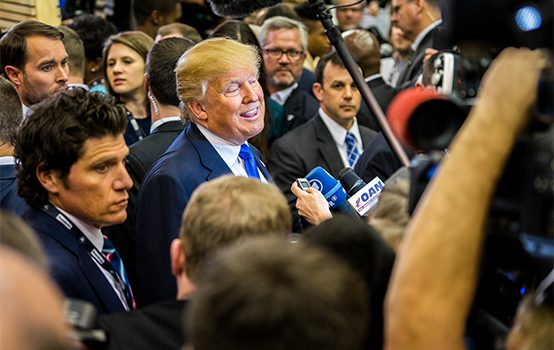Unseemly, Censurable, But Not Impeachable

President Donald Trump’s misconduct revealed by the Mueller Report is unseemly. It’s censurable. The report is neither fake news nor the result of a witch hunt. It is fair game for the 2020 presidential election.
But it does not prove an impeachable offense justifying Trump’s removal from office.
The president is the most powerful elected officer in the land—the only elected official who represents a nationwide constituency. A presidential election sits at the apex of self-government. It is the ultimate exercise of popular sovereignty. It should not be disturbed absent convincing proof of a clear and present danger to our constitutional dispensation.
The customary remedy for an erring or wayward president is a denial of reelection. The extraordinary remedy of impeachment by the House of Representatives, conviction by a two-thirds vote of the Senate, and removal from office, is warranted under Article II, section 4 of the Constitution only for “treason, bribery, or other high crimes and misdemeanors.” That is and ought to be a very high standard, which the Mueller Report does not satisfy.
Special Counsel Robert Mueller was tasked to investigate Russian interference in the 2016 presidential election. The 448-page report found overwhelming evidence that Russia attempted to influence the outcome in favor of Trump and against the Democratic Party nominee Hillary Clinton. But the report, like every other formal or informal investigation of the 2016 election, did not unearth a single voter whose mind was changed by the Russian machinations.
Neither did the report show that the hacked emails from John Podesta, the DNC, and the DCCC disclosed by the Russians via Wikileaks were false in any respect. They added to the store of truthful information available in the public domain to facilitate educated voting. Wikileaks’ publication of the hacked emails was indistinguishable from the publications of the purloined Pentagon Papers by The New York Times and The Washington Post to inform the American people about the Vietnam War. The Supreme Court held that publication of the stolen documents was protected by the First Amendment in New York Times v. United States in 1971.
The United States intelligence community has falsely maintained or insinuated that Russia successfully manipulated American voters in the 2016 presidential election to enhance its own political standing and budgets. The intelligence community has proffered no evidence to support its naked speculation.
The report concluded that neither the Trump campaign nor any American conspired or coordinated with the Russians to assist Trump’s candidacy.
Additionally, nothing in the Report shakes confidence in the constitutional legitimacy of Trump’s defeat of Clinton.
Furthermore, the report makes out a non-trivial case for impeaching Trump for numerous ill-advised and censurable attempts to obstruct Mueller’s investigation of Russian interference. But the case as it reads now is unconvincing. It falls far short of the evidence marshaled to impeach President Richard Nixon and President Bill Clinton, respectively, for obstruction of justice. (Nixon resigned to prevent his certain impeachment and conviction).
Militating against Trump’s impeachment is the fact that the Special Counsel’s $25 million investigation featuring 19 lawyers was uncompromised. Every investigative and prosecutorial decision was made by Mueller free of outside influence. Among other things, he decided to forego seeking a subpoena for Trump’s testimony based on legitimate prosecutorial discretion. Trump refrained from invoking executive privilege or the attorney-client privilege. Moreover, there was no underlying crime of conspiracy or coordination with Russia that Trump would have a motive to conceal.
On the other hand, even failed attempts to obstruct justice can be impeachable offenses. It depends on the degree of direct personal culpability. In the case of Nixon, he was charged, among other things, with counseling witnesses to give false testimony, making false and misleading statements to law enforcement, approving the surreptitious payment of money to buy silence all for the purpose of concealing underlying Watergate crimes, including burglary of the DNC headquarters.
In the case of Clinton, he was charged with making or orchestrating false and misleading testimony to a federal court and grand jury to protect himself from a sexual harassment lawsuit.
Trump’s acts were distant from actual obstruction. He delivered orders, all of which were disobeyed and forgotten, to have Mueller fired, to have Attorney General Jeff Sessions un-recused, to curtail the scope of the Mueller investigation, and to hint at the possibility of a pardon for favorable testimony. But none of Trump’s actions compromised Mueller’s search for truth about Russian interference. And Trump’s motive might have been as much or more political than legal because neither he nor his campaign was complicit in any underlying crime that Mueller was investigating.
In sum, the Special Counsel’s investigation was legitimate. Incriminating evidence was unearthed about the Trump campaign and Trump himself, even if short of crime. The investigation, without more, should deter Trump and his successors from future meddling in the administration of justice.
The Mueller Report, however, does not pass the exacting threshold constitutionally required to overturn a presidential election.
Bruce Fein was associate deputy attorney general and general counsel of the Federal Communications Commission under President Reagan and counsel to the Joint Congressional Committee on Covert Arms Sales to Iran. He is a partner in the law firm of Fein & DelValle PLLC.